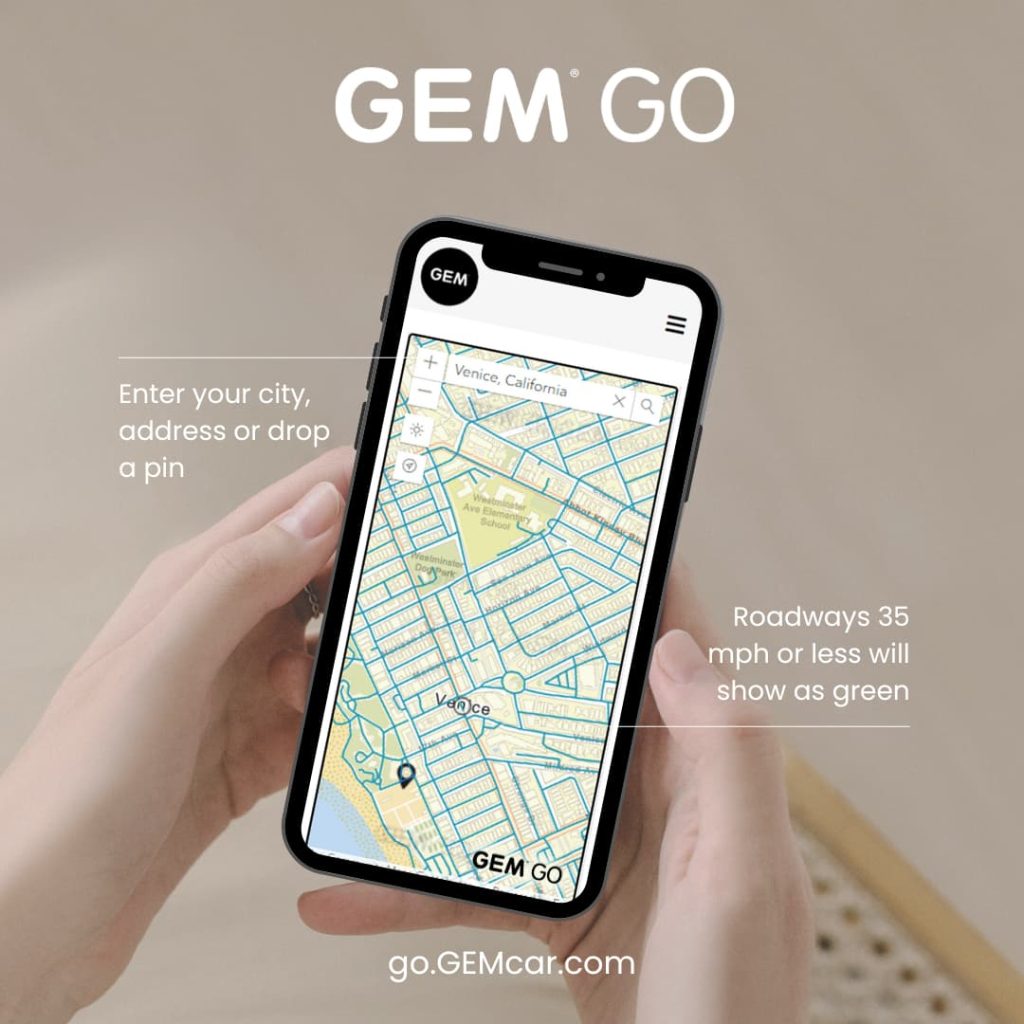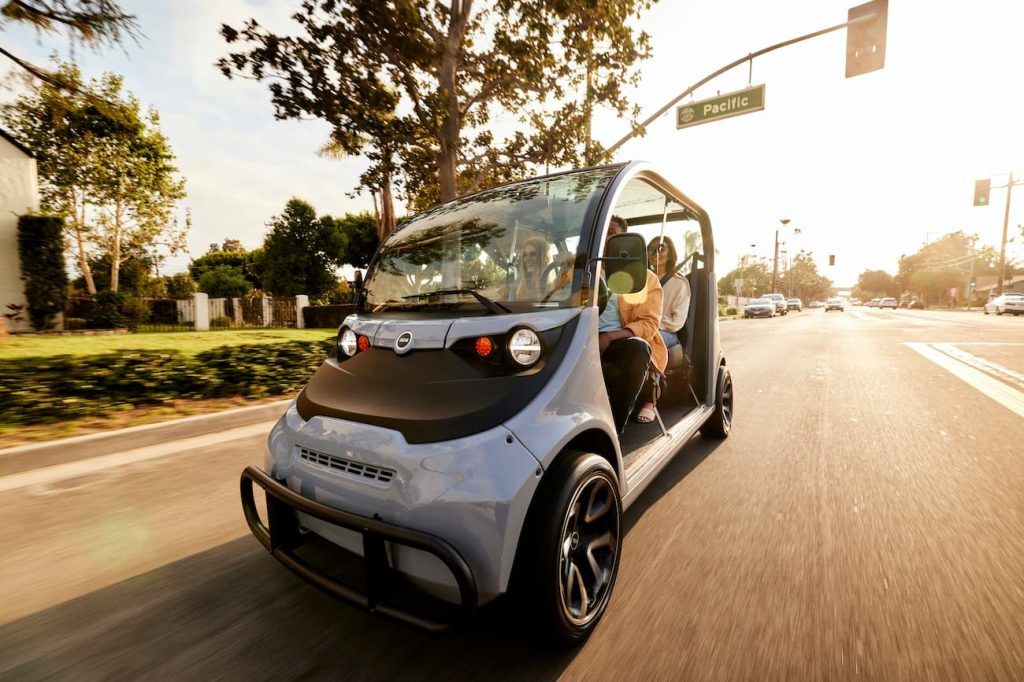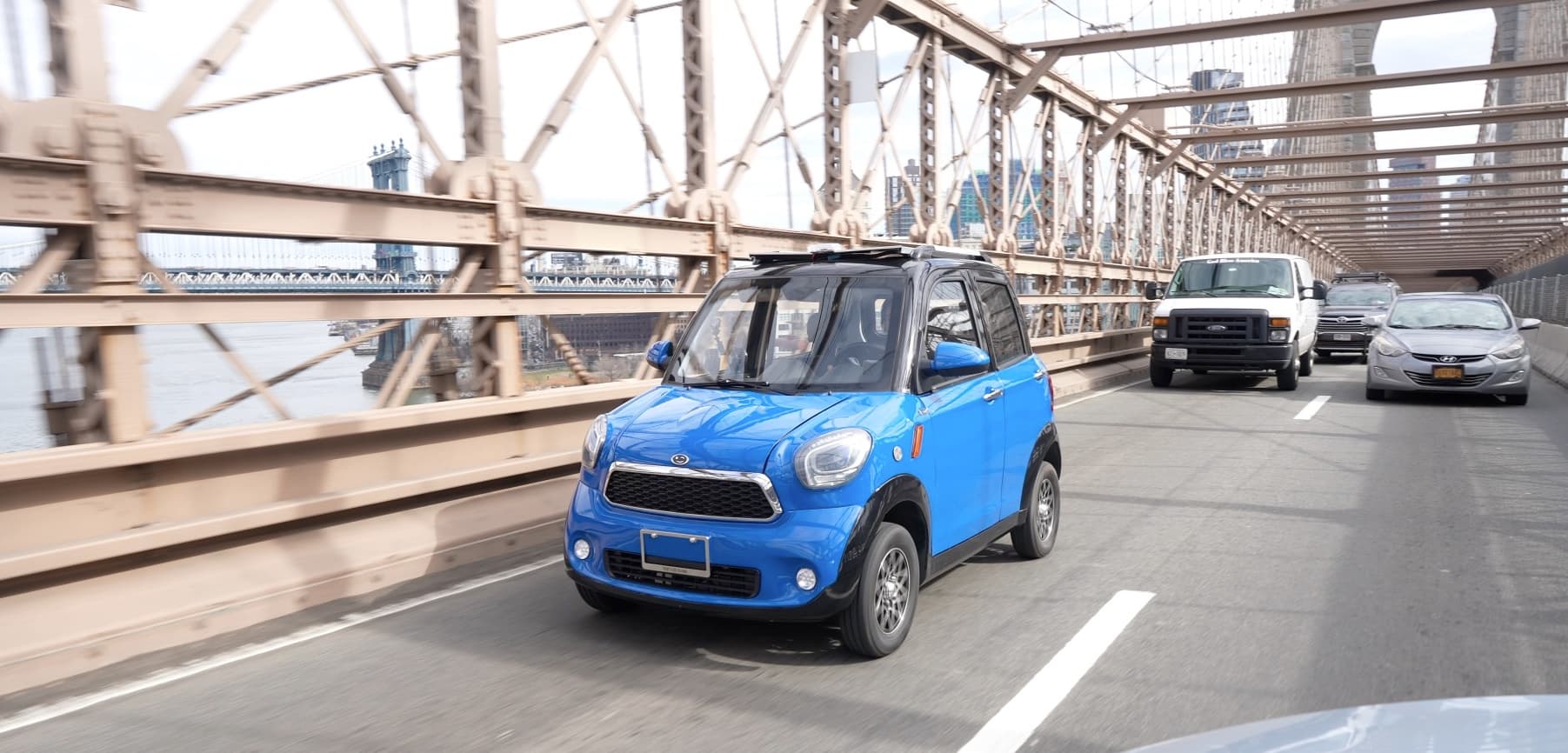
GEM, a low-speed vehicle (LSV) manufacturer in Anaheim, California, has just released a new app to make it even easier to use those small vehicles. The GEM Go app shows users a map of all roads in their area and highlights the streets with posted speed limits of 35 mph (56 km/h) or lower.
Low-speed vehicles (LSVs) are a federally regulated class of motor vehicles in the US. They often look like micro-cars or golf carts, but must meet a certain set of safety requirements that go above and beyond golf cart regulations.
LSVs that meet those requirements are allowed to travel at speeds of up to 25 mph (40 km/h) and are allowed to operate on roads with speed limits of 35 mph (56 km/h) or lower.
GEM’s new app is designed to make it even easier to plan trips and determine which roads are accessible by LSVs.
Some areas have a limited number of roads with speed limits of 35 mph or lower. In other areas, like apparently Venice in Los Angeles (as seen in the app example below), pretty much any asphalt you can find is fair game.

GEM Go is a free web-based, mobile-friendly, interactive mapping app available at go.GEMcar.com. It is designed to be easy to use anywhere, even on your phone when heading out for a trip.
It of course works for planning trips with any LSV, not just GEM’s vehicles, and cyclists may even find it handy in a pinch to help avoid faster roads that are less friendly to bikes.
Playing around with it myself, it’s apparent just how much of the US is accessible by low-speed vehicles. Every city I look at is covered by a sprawling network of blue lines, showing me everywhere I can legally drive an LSV.
In fact, more than half of the roadways in the US have speed limits below 35 mph, and that number is actually growing as cities make the responsible decision to reduce speed limits for the safety of all road users. Washington, D.C., for example, has a default speed limit of 20 mph (32 km/h). LSVs can thus reach any part of the city. Heck, they could get a speeding ticket if a cop is having a bad day.

The CEO of GEM’s parent company Waev, Keith Simon, explained that he hopes the availability of the app will help encourage more people to use LSVs around the country:
GEM has been leading the charge in LSVs for more than 25 years. We created the GEM Go mapping app to help current and future GEM owners understand the breadth of places LSVs can actually operate – it’s eye-opening and we expect it will drive even greater adoption of LSVs across the country.
The number of LSVs on US roads is growing, even if they remain a small minority of total motor vehicles in use. There’s been a push toward smaller vehicles in many cities, with golf carts getting their own boost. Unlike golf carts though, which aren’t street legal outside of a few specific cities that have passed golf cart ordinances, LSVs contain more federally regulated safety features and are street legal almost everywhere.
Their safety can’t be compared to that of typical passenger cars that are rated for highway use, but their intended use in lower speed environments around slower moving traffic means that they usually don’t face the same collision risks faced by larger cars.
Simon believes that LSV numbers will continue to grow in the US, explaining:
Although we have an extensive installed base with GEM, it represents a very small fraction of what LSVs can become in the market when you keep breaking down the barriers like the lack of understanding of where GEM vehicles can be driven. With our recent launch of the all new MY24 GEM and now GEM Go we are on the leading edge of driving the LSV category forward.

Electrek’s Take
Anyone who knows me will already know I’m one of the biggest proponents of LSVs out there. Heck, google “LSV” and you’ll probably find that half the bylines are mine.
And so I love the idea of this new app to make it even easier and safer to find LSV-appropriate roads. If it actually mapped a journey for you, that’d be even better. But knowledge is half the battle and so even just showing you all of the roads you can use is a great asset.
As someone who loves LSVs and advocates for them, I can already tell you that the biggest argument against these handy vehicles is the misconception that they aren’t safe. You’ll certainly find people in the comments section below this article saying that a 25 mph vehicle shouldn’t be on a 35 mph road (they inevitably didn’t read this far). And I understand that sentiment – trust me, I do. I use LSVs all the time and I get it.

When I’m doing 25 mph on a 35 mph road with other cars doing 45 mph around me, it’s…. less than ideal. So I don’t do it very often (crossing the Brooklyn Bridge above was a rare example for me). While LSVs can legally be on 35 mph roads, I like to stick to even slower roads when possible. But so many cities these days have safer, slower speed limits. Washington, DC, defaults to 20 mph. Boston, New York City, Seattle, and many other major cities default to 25 mph citywide speed limits. It’s easier than ever to get somewhere in an LSV, and that is only improving.
And if I may say so from my own experience, it’s also more fun to go somewhere in an LSV. It’s novel and creates a more engaging experience. It’s simply fun.
Sure, you’ve got some of the same downsides of cars, such as often being stuck in traffic and not getting the same kind of exercise I get on my e-bikes. But I can also travel with more people, carry more things, have lockable storage, and have a roof over my head keeping me dry (and use the air conditioning in some models). Plus, I’m arguably a bit safer than if I was hit by a car driver while riding my e-bikes. So even though it has some downsides, LSVs are just a lot of fun to use, cost less than “real” cars and take up less space in a city. So anything that makes them even easier to use is a good thing in my book.
Now just don’t ask me to talk about my opinion on increasing the federal speed limit for LSVs. That’s another article for another day.
FTC: We use income earning auto affiliate links. More.





Comments